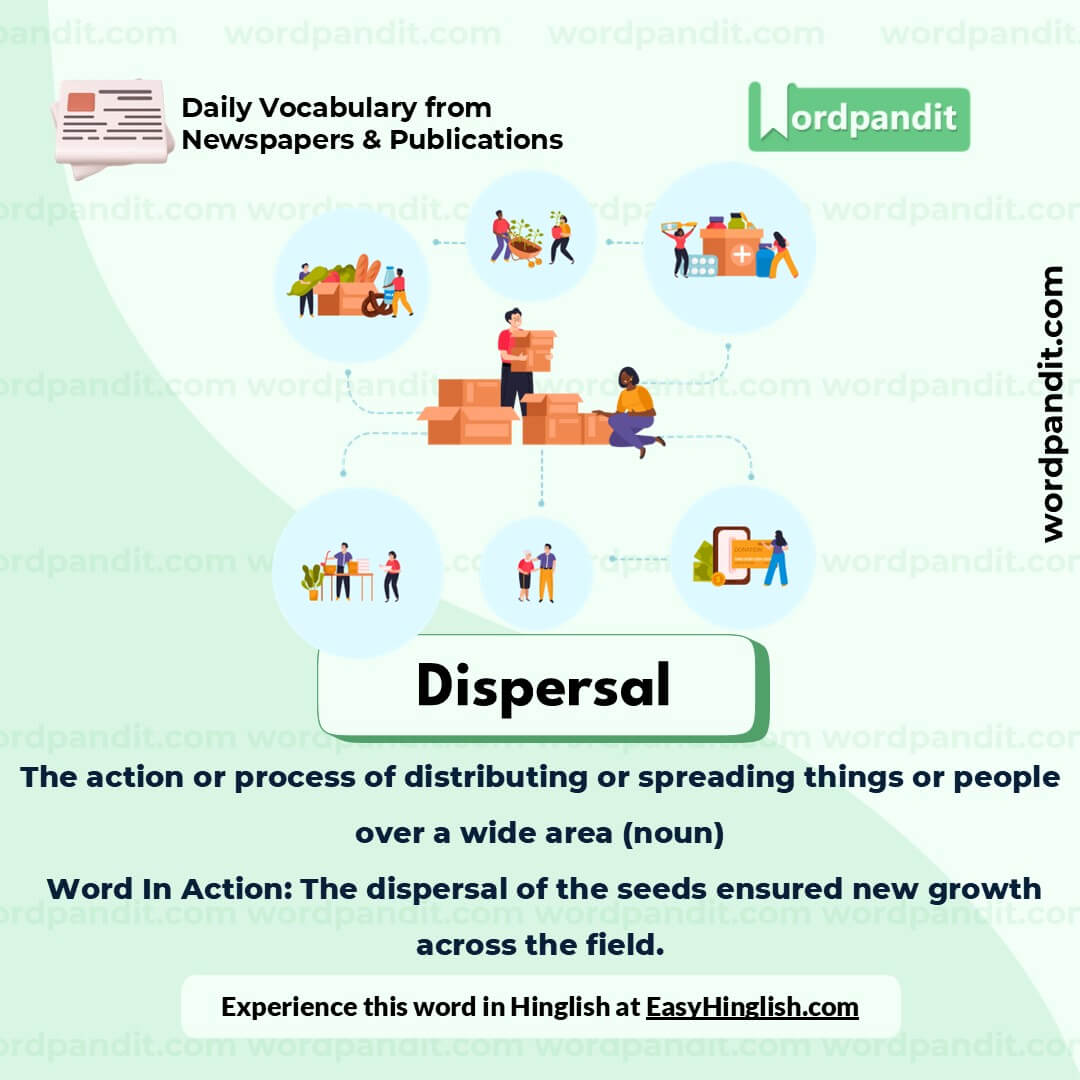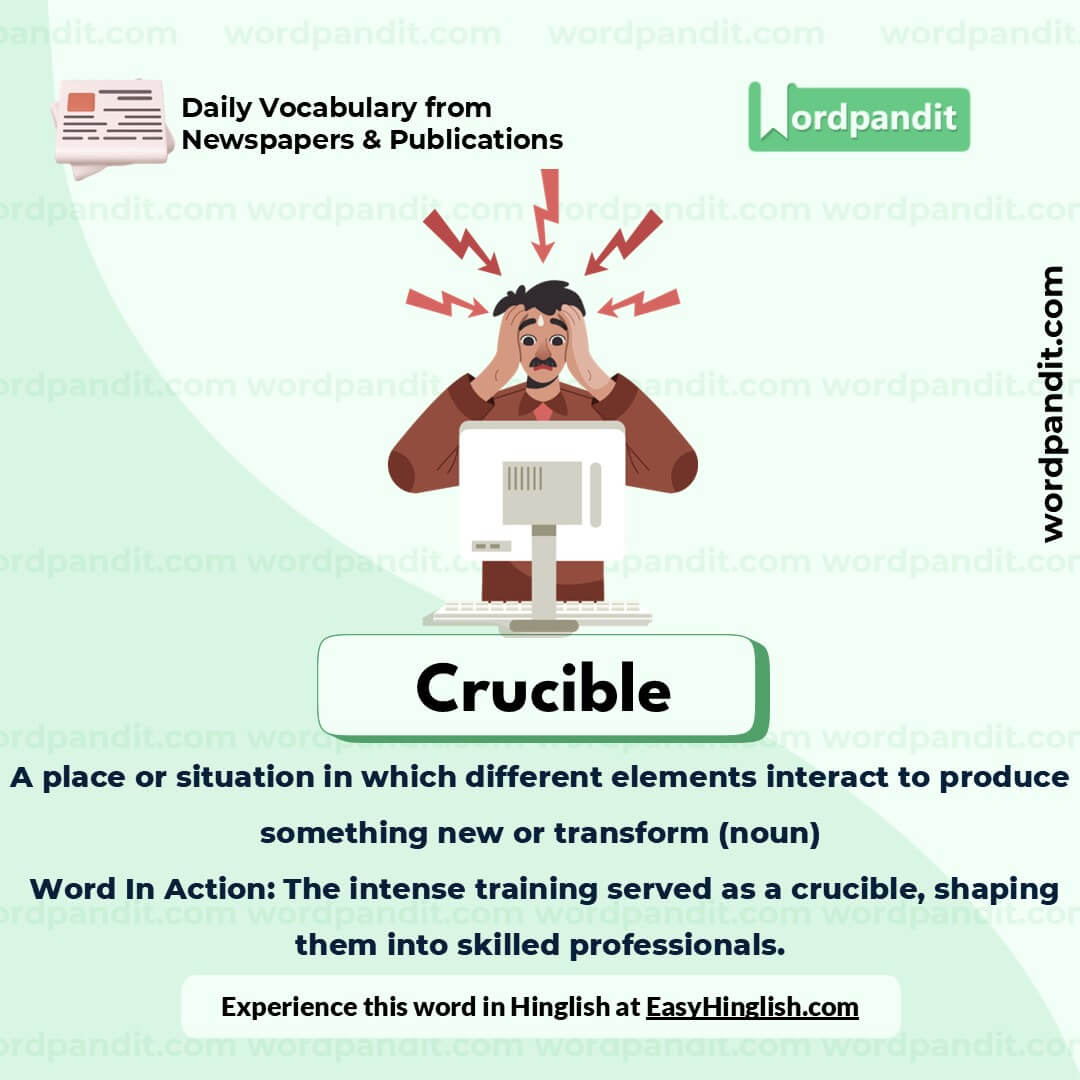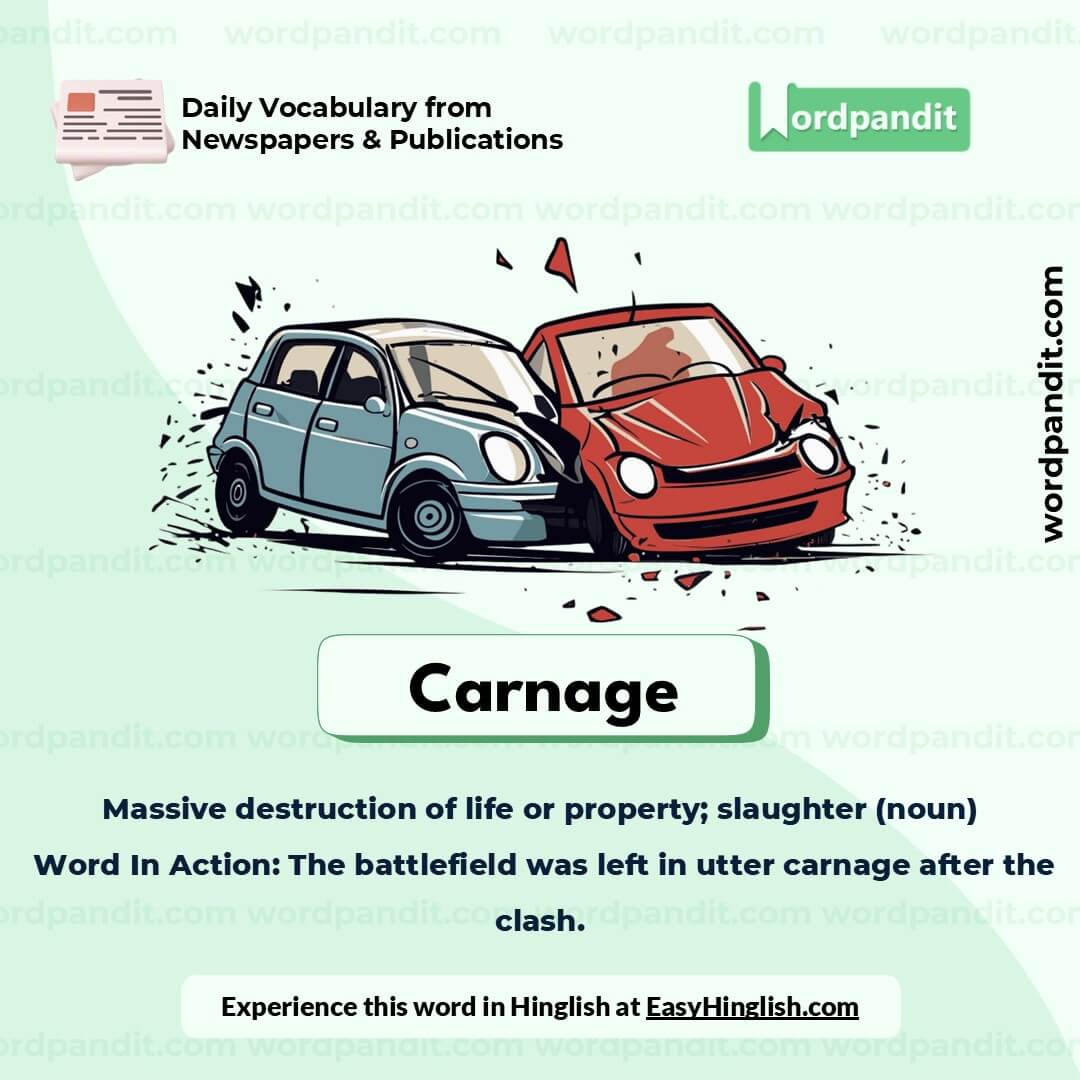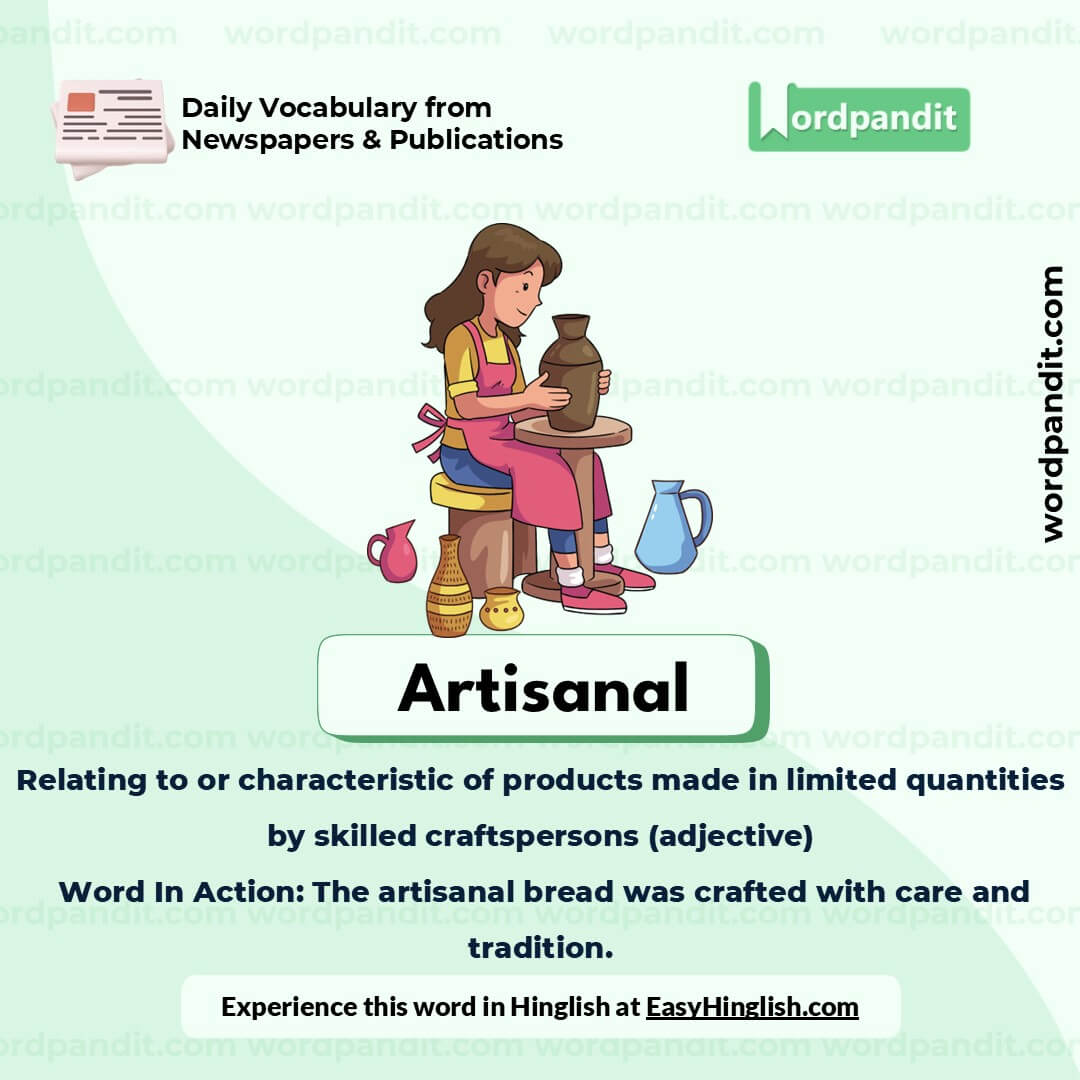Daily Vocabulary from International Newspapers and Publications
Expand Your Vocabulary with Wordpandit’s Global Vocabulary Hub
At Wordpandit, we are committed to helping you develop a truly global vocabulary by drawing from some of the most respected international publications. This section is designed to keep you ahead of the curve by introducing you to words that define global conversations and trends.
The Power of Global Sources
To help you think and communicate on a global scale, we curate vocabulary from renowned international sources, such as:
- The New York Times
- The Washington Post
- BBC
- The Guardian
- The Economist
- Scientific American
- Psychology Today
- And many more...
Stay Global, Stay Competitive
Our daily updates from international publications ensure you are consistently exposed to new words that reflect global news and developments, making sure your vocabulary is not only current but also globally relevant.
Enhance Your Global Perspective
Whether you’re preparing for international exams, aiming to excel in global business communication, or want to enhance your language skills for personal growth, Wordpandit offers the resources you need to thrive in a global context.
Effective Learning, Global Reach
Our learning methodology combines global examples, memory aids, and interactive activities, allowing you to internalize new words effectively and apply them in real-world scenarios.
Begin Your Global Vocabulary Journey Now!
Why Choose Wordpandit?
Practical Learning: Focus on words you'll actually encounter in real-world reading, enhancing your comprehension and communication skills.
Diverse Content: From current affairs to scientific breakthroughs, our varied sources expose you to vocabulary across multiple domains.
Effortless Integration: Make Wordpandit a part of your daily routine. Just a few minutes each day can significantly boost your lexicon over time.
Your Path to Vocabulary Mastery
- Visit our Daily Vocabulary section regularly
- Explore new words and their usage in context
- Practice incorporating these words into your own writing and speech
- Track your progress as your vocabulary expands
Start Your Journey Today
Embark on your vocabulary enhancement journey with Wordpandit. By consistently engaging with our daily posts, you'll build a robust vocabulary that serves you well in academic, professional, and personal contexts.
Remember, a word a day keeps linguistic limitations at bay. Make Wordpandit your daily companion in the quest for vocabulary excellence!
WORD-1: Accreditation
Context:
"Lawmakers have also threatened to revoke accreditation and pull federal funding." - Al Jazeera
Explanatory Paragraph:
Accreditation is an official endorsement or approval, especially by an authoritative body, signifying that an institution, organization, or program meets certain quality standards. It is commonly used in fields like education, healthcare, and professional industries to maintain trust and ensure a level of quality.
Meaning: The process by which an institution or program is officially recognized as meeting specific standards (noun)
Pronunciation: uh-kred-i-TAY-shuhn
Difficulty Level: ⭐⭐⭐ (Intermediate)
Etymology: From Latin accreditare meaning "to give credit to" or "to entrust"
Synonyms & Antonyms:
Synonyms: certification, authorization, endorsement, validation
Antonyms: disapproval, rejection, invalidation, discredit
Usage Examples:
- The university recently received accreditation from a national education board.
- Accreditation ensures that a medical facility meets industry standards for quality and safety.
- The accreditation process was rigorous, involving multiple inspections and assessments.
- Without accreditation, the institution may struggle to attract new students.
Cultural Reference:
"In higher education, accreditation plays a pivotal role in maintaining academic integrity and quality." - Education Weekly
Think About It:
Why might accreditation be essential for institutions like hospitals and universities? How would it impact their operations and reputation?
Quick Activity:
Research a local school or hospital and find out if it is accredited. What standards or accrediting bodies are involved in their certification process?
Memory Tip:
Think of "accreditation" as a "credit" of approval, a stamp that certifies quality and trustworthiness.
Real-World Application:
Accreditation is crucial for students choosing colleges and professionals seeking reputable training programs. It assures stakeholders that the institution or program meets high standards.
WORD-2: Dispersal
Context:
"Those found to be in violation of these charges could face 'dispersal, disciplinary action or criminal charges." - Al Jazeera
Explanatory Paragraph:
Dispersal refers to the act of distributing or scattering people, objects, or substances over a wide area. It is often used in social, environmental, and scientific contexts, such as the dispersal of a crowd or the spread of seeds in nature.
Meaning: The action or process of distributing or spreading things or people over a wide area (noun)
Pronunciation: dih-SPUR-suhl
Difficulty Level: ⭐⭐ (Intermediate)
Etymology: From Latin dispersus, meaning "to scatter"
Synonyms & Antonyms:
Synonyms: scattering, distribution, diffusion, spread, scattering
Antonyms: concentration, gathering, collection, accumulation
Usage Examples:
- The police ordered the dispersal of the crowd after the event.
- The dispersal of seeds by the wind ensures the plant species can spread over large areas.
- Due to the rain, there was a quick dispersal of people from the park.
- The dispersal of information about health guidelines is essential during an outbreak.
Cultural Reference:
"Crowd dispersal techniques have evolved over the years to ensure both public safety and respect for freedom of assembly." - The Guardian
Think About It:
In what situations might dispersal be necessary to maintain order or safety, and what methods can be used to achieve it peacefully?
Quick Activity:
Think of a scenario where dispersal would be essential (e.g., a crowded event). Write a brief plan on how you would ensure the dispersal is handled smoothly and safely.
Memory Tip:
Remember "dispersal" by thinking of "disperse all"—a way to spread things out over a large area.
Real-World Application:
Understanding dispersal helps in fields like crowd control, environmental science (e.g., seed dispersal), and data distribution, where effective spread is essential.
WORD-3: Crucible
Context:
"Higher education institutions have always been crucibles of social change." - Al Jazeera
Explanatory Paragraph:
A crucible is a situation or place where powerful forces interact, often leading to intense transformation, growth, or change. Originally referring to a container used in laboratories to melt substances at high temperatures, the term is also used metaphorically to describe challenging environments that bring about significant development, especially in social or personal contexts.
Meaning: A place or situation in which different elements interact to produce something new or transform (noun)
Pronunciation: KROO-suh-buhl
Difficulty Level: ⭐⭐⭐⭐ (Advanced)
Etymology: From Latin crucibulum meaning "earthen pot used for melting metals"
Synonyms & Antonyms:
Synonyms: testing ground, forge, trial, cauldron, melting pot
Antonyms: stagnation, stability, ease, peace
Usage Examples:
- The military boot camp is seen as a crucible for shaping disciplined soldiers.
- Her experiences during the internship served as a crucible that prepared her for the corporate world.
- World War II was a crucible that transformed political and social structures across the globe.
- The crucible of competitive sports teaches athletes resilience and teamwork.
Cultural Reference:
"The Crucible," a play by Arthur Miller, uses the word metaphorically to depict how a harsh, intense situation reveals people's true nature.
Think About It:
How do you think challenging situations act as a crucible, shaping people’s beliefs, skills, or identities?
Quick Activity:
Identify a moment in your life that served as a "crucible" for personal growth. Describe the situation and what you learned from it.
Memory Tip:
Think of "crucible" as "crucial battles"—intense situations that test and shape character.
Real-World Application:
The term "crucible" is used in leadership, psychology, and personal development to describe transformative experiences that forge resilience and adaptability.
WORD-4: Carnage
Context:
"Defending this carnage, it cannot be business as usual at the neoliberal university." - Al Jazeera
Explanatory Paragraph:
Carnage refers to extensive destruction or loss of life, often due to violent events like battles or disasters. It evokes a scene of chaos and devastation, leaving a strong impression of suffering and ruin. The word is frequently used in discussions about the aftermath of conflicts, but it can also be applied metaphorically to describe non-violent, yet similarly destructive situations.
Meaning: Massive destruction of life or property; slaughter (noun)
Pronunciation: KAHR-nij
Difficulty Level: ⭐⭐⭐⭐ (Advanced)
Etymology: From French carnage, meaning "slaughter," derived from Latin carnaticum meaning "flesh"
Synonyms & Antonyms:
Synonyms: massacre, bloodshed, slaughter, devastation, destruction
Antonyms: peace, harmony, calm, tranquility
Usage Examples:
- The battlefield was a scene of unimaginable carnage after the lengthy conflict.
- The hurricane left a path of carnage, with houses destroyed and communities uprooted.
- Historians study wars to understand the social impacts of the carnage they caused.
- Online gaming often portrays scenes of carnage in battle simulations.
Cultural Reference:
In popular culture, "carnage" is often used to describe the destruction in action movies, where scenes depict intense battles or disasters.
Think About It:
How does the imagery of "carnage" in news or media affect the way we perceive events involving conflict or disaster?
Quick Activity:
Write a short description of a peaceful scene, then rewrite it by adding elements of "carnage" to see how the mood changes.
Memory Tip:
Think of "carnage" as "car-into-garbage," imagining the aftermath of a destructive scene for a mental link.
Real-World Application:
Understanding "carnage" can add emotional impact in discussions about war, natural disasters, or large-scale crises, making it effective in storytelling or journalism.
WORD-5: Artisanal
Context:
"In the US, craft beer had created a whole universe of beer drinkers who wanted to care about the quality of their beer and the artisanal way in which it was made – by skilled professionals, in small batches." - The Guardian
Explanatory Paragraph:
Artisanal describes products crafted by hand in small quantities, often emphasizing quality, skill, and tradition over mass production. This term is widely associated with food, beverages, and other handmade goods that showcase the maker’s expertise, authenticity, and care in the production process.
Meaning: Relating to or characteristic of products made in limited quantities by skilled craftspersons (adjective)
Pronunciation: ar-TIZ-uh-nuhl
Difficulty Level: ⭐⭐ (Intermediate)
Etymology: From Italian artigiano, meaning "craftsman" or "artisan"
Synonyms & Antonyms:
Synonyms: handcrafted, craft, bespoke, handmade, boutique
Antonyms: mass-produced, factory-made, industrial, synthetic
Usage Examples:
- The artisanal bakery uses traditional recipes and locally sourced ingredients.
- People are willing to pay more for artisanal cheese made by local farmers.
- Artisanal coffee shops emphasize the quality and origin of their beans.
- He prefers artisanal furniture crafted by local artisans over factory-made options.
Cultural Reference:
Artisanal products have gained popularity with the rise of the "slow food" movement, which promotes food that is crafted with care, tradition, and attention to quality.
Think About It:
Why do you think people are drawn to artisanal products over mass-produced ones? What value do they find in the craftsmanship?
Quick Activity:
Find an artisanal product near you, whether it’s food, drink, or a handmade item. Research what makes it “artisanal” and consider what qualities set it apart.
Memory Tip:
Think of "artisanal" as "art in small"—artfully crafted products made with skill in small quantities.
Real-World Application:
Artisanal items are popular in markets for consumers who value uniqueness and quality, supporting small businesses and skilled craftspeople over large-scale manufacturing.


















